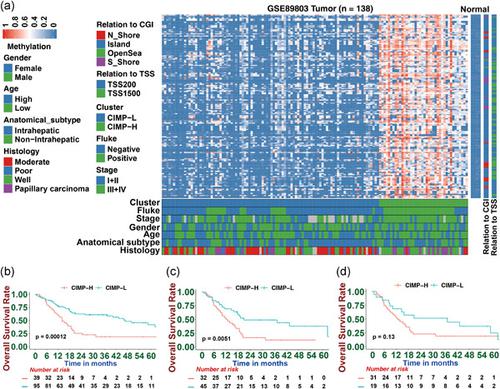当前位置:
X-MOL 学术
›
J. Cell. Physiol.
›
论文详情
Our official English website, www.x-mol.net, welcomes your feedback! (Note: you will need to create a separate account there.)
Development and validation of a CpG island methylator phenotype‐related prognostic signature for cholangiocarcinoma
Journal of Cellular Physiology ( IF 5.6 ) Pub Date : 2020-09-29 , DOI: 10.1002/jcp.30082 Junnan Liang 1 , Tongtong Liu 2 , Jingyu Liao 1 , Lu Zhang 1 , Mi Zhou 1 , Weiqi Xu 1 , Yi He 1 , Guangzhen Cai 1 , Guannan Jin 3 , Jia Song 1 , Ganxun Li 1 , Huifang Liang 1 , Zeyang Ding 1 , Bixiang Zhang 1
Journal of Cellular Physiology ( IF 5.6 ) Pub Date : 2020-09-29 , DOI: 10.1002/jcp.30082 Junnan Liang 1 , Tongtong Liu 2 , Jingyu Liao 1 , Lu Zhang 1 , Mi Zhou 1 , Weiqi Xu 1 , Yi He 1 , Guangzhen Cai 1 , Guannan Jin 3 , Jia Song 1 , Ganxun Li 1 , Huifang Liang 1 , Zeyang Ding 1 , Bixiang Zhang 1
Affiliation

|
Cholangiocarcinoma (CCA) still has a very unfavorable prognosis with a very high mortality, which is complicated by a lack of prognostic biomarkers. In this study, CCA patients in the Gene Expression Omnibus (GEO) cohort were categorized into two subtypes. Differentially expressed and methylated genes were identified, and the impact of DNA methylation in the trans‐regulation of gene expression was investigated. Finally, a CIMP‐related methylation signature specific for CCA (CMSC) was trained in GEO and validated in the Tongji cohort. A subset of patients with CIMP‐H was identified, which was correlated with an unfavorable prognosis. Gene enrichment analysis implied the potential mechanism of CIMP as a promoter of carcinogenesis by regulating proliferation. The trans‐regulation among differentially methylated CpG sites and genes with the same change trends was positively correlated, while the converse situation showed a negative correlation. Notably, CMSC based on four genes could significantly classify CCA patients into low‐ and high‐risk groups in the GEO cohort, and the robustness of CMSC was validated in the Tongji cohort. The results of receiver operating characteristic analysis further indicated that CMSC was capable of highly sensitive and specific prediction of the patient outcomes in CCA. In conclusion, our work highlights the clinical significance of CMSC in the prognosis of CCA.
中文翻译:

胆管癌 CpG 岛甲基化表型相关预后特征的开发和验证
胆管癌 (CCA) 仍然具有非常不利的预后和非常高的死亡率,由于缺乏预后生物标志物而变得复杂。在这项研究中,基因表达综合 (GEO) 队列中的 CCA 患者被分为两种亚型。鉴定了差异表达和甲基化的基因,并研究了 DNA 甲基化对基因表达反式调节的影响。最后,针对 CCA (CMSC) 的 CIMP 相关甲基化特征在 GEO 中进行了训练,并在同济队列中进行了验证。确定了一部分 CIMP-H 患者,这与不良预后相关。基因富集分析暗示了CIMP通过调节增殖作为致癌促进剂的潜在机制。差异甲基化的CpG位点与变化趋势相同的基因间的反式调节呈正相关,反之则呈负相关。值得注意的是,基于四个基因的 CMSC 可以显着将 CCA 患者分为 GEO 队列中的低风险和高风险组,并且 CMSC 的稳健性在同济队列中得到验证。接受者操作特征分析的结果进一步表明,CMSC 能够对 CCA 中的患者结果进行高度敏感和特异的预测。总之,我们的工作突出了 CMSC 在 CCA 预后中的临床意义。基于四个基因的 CMSC 可以显着将 CCA 患者分为 GEO 队列中的低风险和高风险组,并且 CMSC 的稳健性在同济队列中得到验证。接受者操作特征分析的结果进一步表明,CMSC 能够对 CCA 中的患者结果进行高度敏感和特异的预测。总之,我们的工作突出了 CMSC 在 CCA 预后中的临床意义。基于四个基因的 CMSC 可以显着将 CCA 患者分为 GEO 队列中的低风险和高风险组,并且 CMSC 的稳健性在同济队列中得到验证。接受者操作特征分析的结果进一步表明,CMSC 能够对 CCA 中的患者结果进行高度敏感和特异的预测。总之,我们的工作突出了 CMSC 在 CCA 预后中的临床意义。
更新日期:2020-09-29
中文翻译:

胆管癌 CpG 岛甲基化表型相关预后特征的开发和验证
胆管癌 (CCA) 仍然具有非常不利的预后和非常高的死亡率,由于缺乏预后生物标志物而变得复杂。在这项研究中,基因表达综合 (GEO) 队列中的 CCA 患者被分为两种亚型。鉴定了差异表达和甲基化的基因,并研究了 DNA 甲基化对基因表达反式调节的影响。最后,针对 CCA (CMSC) 的 CIMP 相关甲基化特征在 GEO 中进行了训练,并在同济队列中进行了验证。确定了一部分 CIMP-H 患者,这与不良预后相关。基因富集分析暗示了CIMP通过调节增殖作为致癌促进剂的潜在机制。差异甲基化的CpG位点与变化趋势相同的基因间的反式调节呈正相关,反之则呈负相关。值得注意的是,基于四个基因的 CMSC 可以显着将 CCA 患者分为 GEO 队列中的低风险和高风险组,并且 CMSC 的稳健性在同济队列中得到验证。接受者操作特征分析的结果进一步表明,CMSC 能够对 CCA 中的患者结果进行高度敏感和特异的预测。总之,我们的工作突出了 CMSC 在 CCA 预后中的临床意义。基于四个基因的 CMSC 可以显着将 CCA 患者分为 GEO 队列中的低风险和高风险组,并且 CMSC 的稳健性在同济队列中得到验证。接受者操作特征分析的结果进一步表明,CMSC 能够对 CCA 中的患者结果进行高度敏感和特异的预测。总之,我们的工作突出了 CMSC 在 CCA 预后中的临床意义。基于四个基因的 CMSC 可以显着将 CCA 患者分为 GEO 队列中的低风险和高风险组,并且 CMSC 的稳健性在同济队列中得到验证。接受者操作特征分析的结果进一步表明,CMSC 能够对 CCA 中的患者结果进行高度敏感和特异的预测。总之,我们的工作突出了 CMSC 在 CCA 预后中的临床意义。



























 京公网安备 11010802027423号
京公网安备 11010802027423号